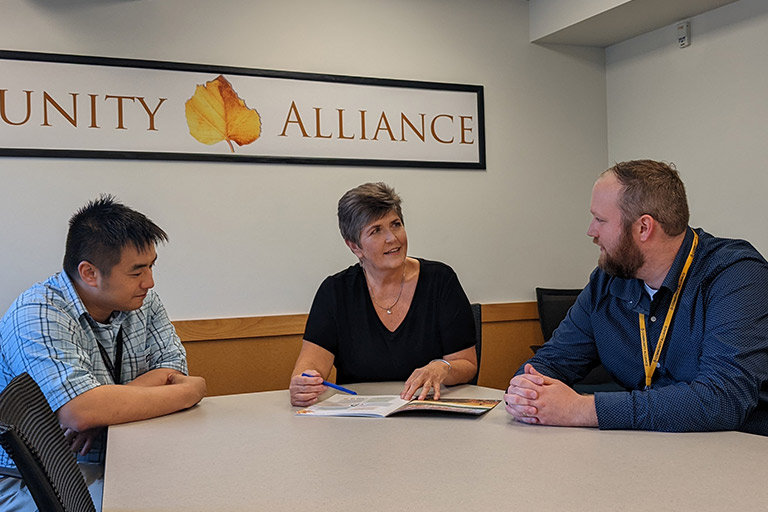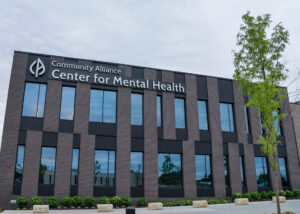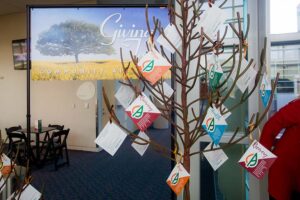Our Journey to Rebuild, Recover, and Renew

The pandemic had a significant impact on Community Alliance’s programming, services, and how they connect to the people they serve. Two longtime Community Alliance team members—Denise Stuart, Director of Rehabilitation Services, and Dana Grisham, Director of Residential Rehabilitation and Day Rehabilitation—saw this firsthand.
“What all of us learned at the height of the pandemic is how important community is,” says Dana. “Our day rehabilitation center is where the people we serve come and can feel that other people understand them, and they learn a lot along the way.”
When the pandemic hit, the center had to abruptly close its doors—and those doors remained closed for more than two months. With the day rehabilitation center closed, many people struggling with mental illness and substance use were left isolated at home. When the doors reopened, in-person programming returned on a limited basis due to a city ordinance that limited groups to no more than 10 people.
“Nothing really takes the place of human connection,” says Dana. “We’ve worked really hard to get people through the doors again.”
A large part of that effort has been to seek out grants that would help Community Alliance re-engage with the community and safely begin to rebuild programming. The team decided to pursue the Substance Abuse and Mental Health Services Administration (SAMHSA) Community Mental Health Centers (CMHC) grant. SAMHSA recognized the significant impact of COVID on the mental health needs within our communities and provided a funding opportunity to help organizations like Community Alliance support and restore the delivery of services that were most impacted by COVID. Community Alliance responded to the call for grant submissions in order to better meet the needs in the community and enhance our ability to support our staff in their daily work.
“Recovery does not happen in isolation,” says Denise. “This grant allows us to explore and re-ignite the possibilities for the people we serve.”
Aileen Brady, Chief Operating Officer at Community Alliance, echoes this. “With this grant, we wanted to not only rebuild but work on the recovery of services with the people we serve as well as renew in some expanded capacities,” says Aileen.
Community Alliance’s grant project—Rebuild. Recover. Renew. —aims to ensure the individuals and families we serve have access to recovery-oriented psychosocial rehabilitation and other evidenced-based behavioral health services to help meet their needs. The project highlights a number of goals, mainly tied to three different areas of service most impacted by the COVID pandemic: day rehabilitation, vocational services, and family education. Because SAMHSA recognized the impact of COVID on behavioral health staff and other caregivers, and the importance of self-care in order to be able to provide the highest quality of services for others, Community Alliance’s grant project also has a specific focus on the self-care of staff.
Strengthening Support for Families
Before the pandemic, families were used to coming together at Community Alliance for classes and support. During the COVID shutdowns, in-person classes and group sessions were quickly replaced by Zoom meetings. But perhaps more worrisome to family members was the realization that their loved one was now isolated in their recovery.
“Families were concerned for their loved ones,” says Aileen. “It caused almost a doubling of calls to our family education program.”
The CMHC grant provided additional funding to support a second staff member in CA’s family education program. While the grant does not fully cover this position, it bolstered the first step toward expanding this important program.
Re-Igniting the Possibility of Work for People in Recovery
Many people in recovery find themselves thinking back to an earlier time in their lives when they held a job, made a decent income, and took pride in having a job. As they struggled with mental illness or substance use and began to rely on benefits, they may have begun to feel and believe that work is out of the question—and that myth can be difficult to dispel.
“You can see people light up when they talk about their past work experiences, but their belief that they can get back there is sometimes waning,” says Dana. “Our staff is really skilled at having those motivational conversations with people, re-igniting that hope and that dream.”
Through the CMHC grant, Community Alliance is strengthening the ties between our day rehabilitation and vocational programs—and achieving more timely access to these services—by bringing on additional vocational staff. The goal is to meet the people we serve where they are and help them explore possible work options moving forward. Employment specialists build on their interests, guide them toward relevant classes, and help them realize they can work and still receive some benefits.
“The value of work is recovery, and a lot of people don’t think about it that way,” says Aileen. “Our goal for the people we serve is for them to feel confident and successful in how they are managing their illnesses, be happy working and feel that they are a part of their community.”
Prioritizing the Well-Being of Staff
The CMHC grant is also helping CA reboot and rebuild our employee wellness program. Our team has partnered with the University of Colorado’s Behavioral Health & Wellness Program (BHWP) to create a Work and Well-Being Community of Practice—a group of people with a shared common concern and interest in improving and fostering wellness.
With the support of the BHWP, the staff wellness committee is focusing on three key areas of wellness. These areas are physical, social, and emotional and were identified through a staff survey.
“If we are not well and not doing what we need to do to take care of ourselves, it’s hard to help those we support,” says Dana. “We are gathering resources and tools that we can offer to our staff to help them rebuild.”
Help Is Within Reach
Community Alliance offers a full range of integrated health services, including primary and psychiatric care, mental health and substance use counseling, rehabilitation and employment services, supportive housing, community, family and peer support, and more.



